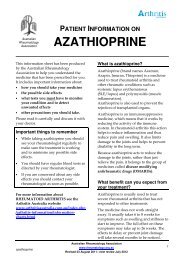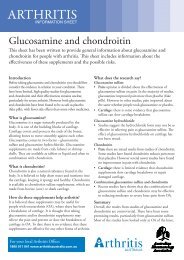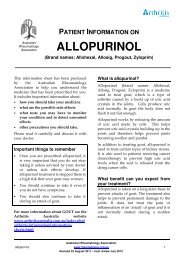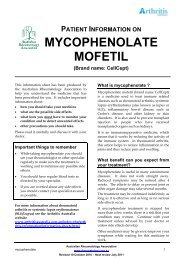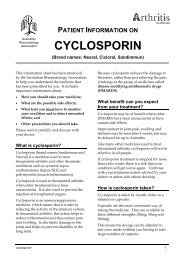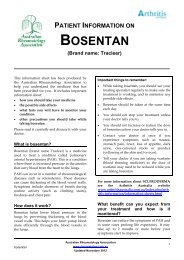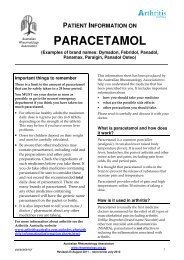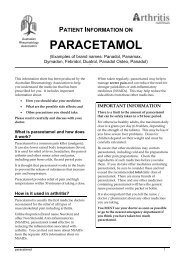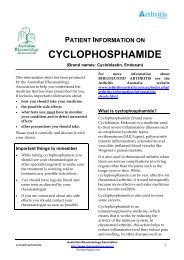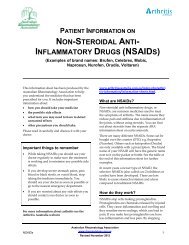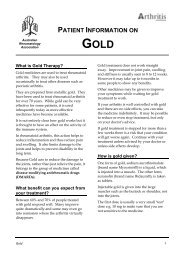AZATHIOPRINE - Australian Rheumatology Association
AZATHIOPRINE - Australian Rheumatology Association
AZATHIOPRINE - Australian Rheumatology Association
Create successful ePaper yourself
Turn your PDF publications into a flip-book with our unique Google optimized e-Paper software.
PATIENT INFORMATION ON<br />
<strong>Australian</strong><br />
<strong>Rheumatology</strong><br />
<strong>Association</strong><br />
<strong>AZATHIOPRINE</strong><br />
Brand names: Imuran, Azahexal, Azapin, Thioprine<br />
This information sheet has been produced by<br />
the <strong>Australian</strong> <strong>Rheumatology</strong> <strong>Association</strong> to<br />
help you understand the medicine that has<br />
been prescribed for you. It includes important<br />
information about:<br />
• How you should take your medicine;<br />
• The possible side effects;<br />
• What tests you must have to monitor your<br />
condition and to detect unwanted effects;<br />
and<br />
• Other precautions you should take.<br />
Please read it carefully and discuss with your<br />
doctor.<br />
What is azathioprine<br />
Azathioprine (brand name Imuran) is a<br />
medicine used to treat rheumatoid arthritis<br />
and other rheumatic conditions such as<br />
systemic lupus erythematosus (SLE/lupus)<br />
and polymyositis (muscle inflammation).<br />
Azathioprine is also used to prevent the<br />
rejection of transplanted organs.<br />
Azathioprine is an immunosuppressive<br />
medicine, which means that it works by<br />
reducing the activity of the immune system.<br />
In rheumatoid arthritis, this action helps to<br />
reduce inflammation and thus reduce pain<br />
and swelling. It also limits damage to the<br />
joints and helps to prevent disability in the<br />
long term.<br />
Because azathioprine acts to reduce the<br />
damage to the joints, rather than just relieve<br />
the pain, it belongs to the group of medicines<br />
called disease modifying antirheumatic drugs<br />
(DMARDs).<br />
What benefit can you expect from<br />
your treatment<br />
Azathioprine is usually used to treat severe<br />
rheumatoid arthritis that has not responded to<br />
other treatments.<br />
The medicine does not work straight away. It<br />
usually takes 6 to 8 weeks for symptoms such<br />
as swelling and stiffness to start to improve.<br />
The full effect on these symptoms may take up<br />
to 26 weeks. The effects to delay or prevent<br />
joint damage will take several months to be<br />
noticed.<br />
Other medicines may be given to improve<br />
your symptoms while waiting for azathioprine<br />
to work.<br />
If azathioprine treatment is stopped for more<br />
than a few weeks there is a risk that your<br />
condition will get worse again. Continue with<br />
your treatment unless advised by your doctor<br />
or unless side effects develop.<br />
How is azathioprine taken<br />
Azathioprine is taken by mouth in 25mg or<br />
50mg tablets. The dose used to treat<br />
rheumatoid arthritis depends on the person’s<br />
body weight. It is usually 50mg to 100mg per<br />
day. The dose can be increased every 1 to 2<br />
months. The maximum dose is usually 75mg<br />
to 150mg per day.<br />
It can be taken as a single dose or twice a day.<br />
The treatment can be continued indefinitely as<br />
long as it is effective and no serious side<br />
effects occur.<br />
It may be used with other arthritis medicines<br />
including:<br />
• other DMARDs;<br />
• steroid medicines such as prednisolone or<br />
cortisone injections into the joint;<br />
azathioprine 1
• anti-inflammatory medicines (NSAIDs)<br />
such as naproxen or ibuprofen; and/or<br />
• simple pain killers such as paracetamol.<br />
Are there any side effects<br />
Overleaf are side effects that you might<br />
experience with your treatment. Tell your<br />
doctor if you experience any side effects.<br />
If you do experience side effects, a reduction<br />
in dose may minimise these so that you can<br />
continue to take the medicine. Your doctor<br />
will advise on any dose changes that are<br />
necessary.<br />
Tell your doctor if you experience any<br />
possible side effects.<br />
Most common possible side effects:<br />
• 10-15% of people taking azathioprine<br />
experience stomach or bowel side effects,<br />
which might include nausea (feeling sick),<br />
vomiting, abdominal pain or diarrhoea.<br />
Taking azathioprine twice daily instead of<br />
all at once, or taking it after eating, may<br />
help avoid these problems. Antinausea<br />
tablets can be used if needed.<br />
• About 5% of people have side effects such<br />
as skin rashes and increased sensitivity to<br />
the sun. It is a good idea to use sunscreen<br />
and to wear a hat when out in the sun.<br />
Less common or rare possible side<br />
effects:<br />
• Effects on the liver and pancreas:<br />
azathioprine can cause liver test<br />
abnormalities or hepatitis (inflammation of<br />
the liver). This occurs in less than 1% of<br />
people taking the medicine. This does not<br />
cause symptoms unless severe so regular<br />
blood tests are important.<br />
If you develop symptoms such as yellow<br />
discolouration of the whites of your eyes<br />
or yellow skin tell your doctor straight<br />
away. Azathioprine can also cause<br />
pancreatitis (inflammation of the<br />
pancreas), which can result in abdominal<br />
pain.<br />
• Blood counts: azathioprine can cause a<br />
drop in the number of white blood cells,<br />
which are needed to fight infection. It can<br />
also cause a drop in the number of<br />
platelets, which help to stop bleeding.<br />
Regular blood tests aim to pick these<br />
problems up early when they occur.<br />
However, if you develop a sore mouth,<br />
mouth ulcers, easy bruising, nosebleeds,<br />
bleeding gums, breathlessness, infection or<br />
fever tell your doctor straight away.<br />
• Hypersensitivity: A small number of<br />
people have a hypersensitivity reaction<br />
one to two weeks after starting<br />
azathioprine. This causes muscle aches<br />
and pains and fever. If you develop any of<br />
these symptoms tell your doctor straight<br />
away.<br />
• Infections: There is an increased risk of<br />
developing some infections, especially<br />
herpes zoster (chicken pox and shingles).<br />
You should try to avoid contact with<br />
people who have these infections. If you<br />
have an infection or persistent fever, tell<br />
your doctor straight away.<br />
What precautions are necessary<br />
Blood tests:<br />
• Before starting azathioprine, you may be<br />
asked to have a blood test to look at an<br />
enzyme (TPMT). This will check whether<br />
your bone marrow cells are more sensitive<br />
to the medicine. The result will decide<br />
whether this treatment is suitable for you<br />
and whether you should use a lower dose.<br />
• Since the liver and blood cells may be<br />
affected by azathioprine, you must have<br />
regular blood tests during your treatment.<br />
This is very important, as you may not get<br />
symptoms of these problems.<br />
• Blood tests are particularly important<br />
during the first few months of treatment.<br />
• As well as monitoring for side effects,<br />
blood tests help to monitor your condition<br />
to determine if the treatment is effective.<br />
• You will need to have full blood counts<br />
and liver function tests every 2 to 4 weeks<br />
for the first few months of treatment and<br />
then every 1 to 3 months after that.<br />
• If there are no abnormalities seen after<br />
three months of treatment at a specific<br />
azathioprine 2
dose of azathioprine, the blood tests may<br />
be done less frequently.<br />
• Your general practitioner will be<br />
informed about the monitoring schedule.<br />
It is important to see your general<br />
practitioner if you have been asked to do<br />
so as they have an important role to play in<br />
monitoring your condition.<br />
Other medicines:<br />
• Azathioprine can interact with other<br />
medicines. You should tell your doctor<br />
(including your GP, rheumatologist and<br />
others) about all medicines you are taking<br />
or plan to take. This includes over the<br />
counter or herbal/naturopathic medicines.<br />
• Allopurinol (Zyloprim, Progout, Allohexal,<br />
Allosig ), used in the treatment of gout,<br />
will increase the level of azathioprine in<br />
the blood causing serious toxicity. THIS<br />
CAN BE VERY DANGEROUS. YOU<br />
MUST TELL YOUR DOCTOR IF YOU<br />
ARE TAKING OR ADVISED TO TAKE<br />
ALLOPURINOL.<br />
• Combined painkillers such as Panadeine<br />
and Panadeine Forte, can be used safely<br />
with azathioprine, provided you take them<br />
as directed.<br />
• Azathioprine can also be used safely with<br />
anti-inflammatory drugs (NSAIDs) as long<br />
as your kidney function is normal.<br />
• Most vaccines can be given safely with<br />
azathioprine. Talk with your<br />
rheumatologist before receiving any<br />
vaccines.<br />
Alcohol:<br />
• Because azathioprine can affect your liver,<br />
you should avoid heavy alcohol use while<br />
taking it. It is not known precisely what<br />
level of drinking is safe when on<br />
azathioprine. However there is general<br />
agreement that 1-2 standard drinks taken<br />
once or twice a week is unlikely to cause a<br />
problem. Drinking a lot (more than 6-8<br />
standard drinks) on one occasion, even if<br />
infrequently, is strongly discouraged.<br />
Pregnancy and breastfeeding:<br />
• Azathioprine has been used safely in<br />
pregnancy and breastfeeding. Should you<br />
wish to become pregnant or you intend to<br />
breastfeed, you should discuss this with<br />
your doctor.<br />
All patients taking azathioprine should be seen<br />
regularly by a rheumatologist to optimise<br />
treatment and minimise any potential side<br />
effects.<br />
Your doctor’s contact details:<br />
If you have any questions or concerns write<br />
them down and discuss them with your doctor.<br />
REMEMBER – Keep all medicines<br />
out of reach of children<br />
The information in this sheet has been obtained from various sources and has been reviewed by the <strong>Australian</strong> <strong>Rheumatology</strong> <strong>Association</strong>. It is<br />
intended as an educational aid and does not cover all possible uses, actions, precautions, side effects, or interactions of the medicines<br />
mentioned. This information is not intended as medical advice for individual problems nor for making an individual assessment of the risks and<br />
benefits of taking a particular medicine. It can be reproduced in its entirety but cannot be altered without permission from the ARA.<br />
The NHMRC publication: How to present the evidence for consumers: preparation of consumer publications (2000) was used as a guide in<br />
developing this publication.<br />
azathioprine<br />
<strong>Australian</strong> <strong>Rheumatology</strong> <strong>Association</strong><br />
3<br />
Revised May 2008 for revision May 2009



